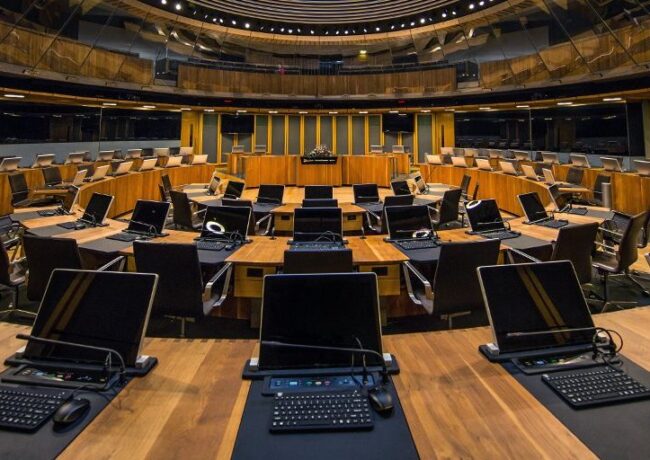Govt ditches major North Wales roadwork projects
The £300m Deeside ‘Red Route’ and £135m Third Menai Crossing were two traffic infrastructure projects that got the red light after a review of potential environmental impacts.
The Welsh government’s decision to cease the projects in their current state was made on the advice of an independent Roads Review Panel. The panel was tasked with examining whether or not projects would increase carbon emissions in the next 15 years. It convened after Wales froze new road projects in June 2021.
The £300m Deeside ‘Red Route’ was also known as the Flintshire Corridor Improvement project. It was meant to create a 13-kilometre long distance dual-carriageway for the A55/A494 to help alleviate traffic congestion. The Welsh government has already spent more than £4m on this scheme.
However, in reviewing the project, the Roads Review Panel found that increasing road capacity would actually make car travel more attractive. This would encourage more people to travel by car rather than public transport, thus increasing the amount of carbon dioxide emissions.
A new multi-modal corridor level programme for the A55, A494, and other SRN routes will replace the previous Flintshire Corridor Improvement project, according to the Welsh government.
The £135m Third Menai Crossing was to create a new, four-lane A55 bridge over the Menai Strait, connecting Anglesey and Gwynedd. The bridge would support pedestrians and cyclists by having better barriers between them and cars. The government has spent £2m on the project already.
The Roads Review Panel found that, like with the Red Route, having a third crossing would increase the number of cars on the road. The panel also noted that constructing the crossing would result in the loss of nearly 11 acres of woodland.
To replace the Third Menai Crossing scheme, the Welsh government has tasked the North Wales Transport Commission to help develop a more sustainable way to tackle the need for a way to cross the Menai Strait.
Wales also chose to halt the current Wrexham A483 Bypass Junctions 3 to 6 project, which would have improved the junctions to help alleviate traffic and enable future residential and employment developments.
Instead, this project will be replaced by a new multi-modal corridor improvements project. The government said it would work with Wrexham Council on the improvements, which will focus on reducing car use.
Roadwork projects that have been abandoned entirely include schemes for the Chester-Broughton Growth Corridor and A4/A483 Halton Roundabout.
Only one of the paused North Wales projects from 2021 was given the green light. This was the A487 Llwyn Mafon project, which seeks to improve the safety of this road through junction modifications, overtaking restrictions, and a lower speed limit.
Welsh deputy climate change minister Lee Waters said it was clear that Wales’s past approach to roadwork improvement was not helping stop climate change.
“Our approach for the last 70 years is not working,” he told the Senedd on Tuesday.
“As the review points out the by-pass that was demanded to relieve congestion often ends up leading to extra traffic, which in time brings further demands for extra lanes, wider junctions, and more roads,” Waters continued.
“Round and round we go, emitting more and more carbon as we do it and we will not get to net zero unless we stop doing the same thing over and over.”
He did clarify that this did not mean Wales would stop investing in its roads.
“In fact, we are building new roads as I speak – but we are raising the bar for where new roads are the right response to transport problems…” he said.
“Of course, doing that in an age of austerity is very challenging,” Waters continued.
“Not only are we not getting our share of HS2 investment, but the UK Government is pushing many bus services over a cliff edge, as well as slashing our capital investment budgets.
“Even if we’d wanted to keep progressing all the road schemes in the pipeline we just do not have the money to do so. Our capital budget will be 8% lower next year in real terms as a result of the UK government’s failure to invest in infrastructure.”
You can see the full list of projects that have been halted in the Welsh government’s Programme for future road investment policy.
You can see explanations for the Road Review Panel’s recommendations in its report: The Future of Road Investment Wales. Justifications for the verdicts on individual projects in North Wales start on page 187 of the PDF.





Any transport improvements should be in rail , eg electrification from Cardiff to Chester, so that trains can then push on to Liverpool( via the Halton Curve) , and Manchester.
In addition the line from Chester to Holyhead is crying out for electrification, linking with the West Coast Main Line.
By Anonymous
Hi guys (and gals) or Hey Up! Only backward economies invest capital in the national transportation infrastructure. All wealthy growing successful economies cut taxes and cut spending: like … I can’t think of one, but there must be one.
By James Yates
What a truly moronic decision, especially as cars will almost all be electric in a couple of decades anyway! Wales is a rural country that needs to invest in its road infrastructure to ensure it stays prosperous in the future and keeps up with the rest of the UK / Europe. I expect the Welsh government will just expect the English to subsidise the shortfall in living standards this will cause…
By MC
Interesting decision and will see how this bears fruit in the years to come. You could be applauding such a bold vision down the line. However, I do have a couple of concerns. Investing in network resilience shouldn’t be discounted where pinchpoints are really causing problems, there needs to be focus on reducing local trips whilst still enabling strategic traffic to complete their journeys efficiently. To that, I don’t really see how you deal with the M4 Newport issues unless something significant happens
By Levelling Up Manager
The world, or more specifically Wales, has gone mad, these decisions wil look foolish when we look back in the future
By DH
This is absolutely the right decision. In the context of the climate emergency there is no question to which ‘more road space’ is a sensible answer.
By the light of the moon
@MC if you think electric cars will solve our problems you have a lot of reading up to do. The environment can’t sustain the ever-increasing demands of modern humans; we need to tackle our exorbitant levels of consumption, not just shift from fossil fuels to batteries and carry on as we were. That’s why we must stop building infrastructure that encourages unsustainable behaviour.
.
The worry for me is public transport investment. If reduced supply of new roads is the “stick”, that’s fine, but will it be properly supported by the “carrot” of a vastly improved and affordable bus and rail network?
By W
“increasing road capacity makes car travel more attractive”, who knew?! Encourage more bus travel by all means but last time I looked they need roads too. The green zealots won’t be happy til we’re living back in the stone age
By Anonymous
Staggering. Surely the move to more and more electric and fuel efficient vehicles would ultimately mitigate many of the climate concerns, which I share, of course. The A483 improvements were (are!) desperately needed, so these decisions, or watered-down proposals, are very disappointing. Who knows, a better public transport provision might ‘attract’ many people out of their cars?! We live in hope!
By OverTheBorder
A very short sighted decision, we need more roads and networks to keep people moving- the reality is that cars and other forms of transport is need to improve peoples life’s- fossil fuels should never demonised
By Stuart wood
It seems to me that traffic congestion causes huge amounts of pollution! It makes sense to eliminate bottlenecks and keep traffic moving at the vehicles’ most efficient pace, that is NOT a maximum of 20 miles per hour. Fools are in charge!
By Alexander Gurney
Another crass decision by the incompetent Welsh Government! Frankly the argument that this will reduce air pollution is at best flakey to say the least, especially when we are on the cusp of an automotive revolution as we increasingly migrate to electricity vehicles. Put simply a regressive decision for tackling old world and increasingly obsolete technology.
By Grumpy Old Git
Tourism is the largest Industry in North Wales past St Asaph, Point of Air.
What in Gods name are the Welsh Gov thinking of.
A massive Park and ride scheme in England.
Park your car in Sealand, Chester , catch a bus to Snowdonia, Anglesey, Caernarvon, Llandudno.
They are reducing trains, not enough Capasity.Coaches .
Well if the Welsh Government published the public transport plan for North Wales we can judge.
A relief road for Ewloe, to the A55.
A new Bridge to replace the old one.
Bonkers in the Senedd, idiots.Killing growth in tourism hospitality jobs.
Idiots, not held to account.
By A Evans